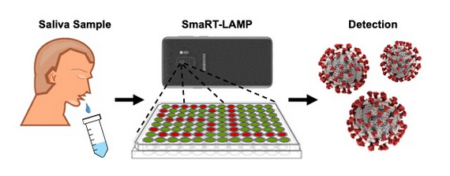Spitting for Covid, who loves DIR fees, latest moderate-drinking verdict, and more
01 Feb 2022
Posted by Andrew Kantor
X marks the Covid
It’s all about speed now — and Scottish engineers have a new AI-based Covid test that gives results in just a few minutes.
Essentially, the computer has learned to recognize the signs of Covid-19 in a chest X-Ray when humans couldn’t distinguish them with our small, meat-based brains.
The downside: The system uses a chest X-ray, so it’s not something you can just stock on the counter. And it doesn’t work for early Covid, when there’s not enough visible yet.
But still, that hasn’t stopped them from using our favorite superlative: “This is potentially game-changing research.”
Spit next to the phone, please
Yes, it’s yet another potential “game changer” — in this case it’s a “cell phone app and lab kit” developed at UC Santa Barbara. Apparently the app is smart enough to diagnose Covid (or, potentially other viruses) based on a saliva sample and a smartphone camera … and the software, of course. It takes just 25 minutes, and it does it on the cheap.
The lab kit can be produced for less than $100, and it requires little more than a smartphone, a hot plate and LED lights. The screening tests can be run for less than $7 each versus $10 to $20 per rapid antigen test and $100 to $150 per PCR test.

In Omicron news
You might think that getting a mild breakthrough case of Omicron isn’t too bad — get it over with, and you’ll have better immunity from Covid-19 in general.
Wronnnnng.
A team led by UC San Francisco and UC Berkeley researchers looked at the effect of vaccination and infection by Delta and Omicron — they were wondering what kind of protection a breakthrough infection give.
Bad news. They found that (probably for the same reason Omicron is milder in general), getting sick with it won’t do your immune system much good: “Omicron-induced immunity may not be sufficient to prevent infection against more pathogenic SARS-CoV-2 variants that are likely to emerge.”
Out of sight, out of mind
Stealth Omicron? Fuggedaboutit. Health officials say the harder-to-detect variant isn’t going be a problem at all. At worst it’ll slow the decline in cases, but it won’t matter much in the big picture.
Well, I guess that settles it.
Pull the other one, it’s got bells on
Did you know that pharmacy DIR fees “can boost health outcomes [and] drug adherence”? In fact, apparently DIR is great stuff for everyone, especially patients! Who says so? That’d be Dr. William Fleming, chief corporate affairs officer for Humana and board chair of the Pharmaceutical Care Management Association — you know, the PBMs.
Please, William, do go on. I’m curious: Is tying yourself up in logical knots tougher when your nose keeps growing? (And do the pants being on fire add a sense of urgency?)
Who should get a fourth shot?
Some people are eligible for a second booster, but apparently not every pharmacy is aware of that. So the CDC held a conference call to say, “Some people are eligible for a second booster.” Specifically, the immunocompromised.
The CDC recommends one additional shot for the 7 million American adults whose weak immune systems make them more vulnerable to Covid infection and death. This group includes people with medical conditions that impair their immune response to infection, as well as people who take immune-suppressing drugs because of organ transplants, cancer, or autoimmune diseases.
Speaking of boosters
Instead of two shots in the arm, why not one vaccine at the site of infection? That’s what Hong Kong researchers think is a smart move. They’re exploring the idea of one DNA vaccine in the arm to get the immune system crankin’, followed by a nasal spray using a viral vector (similar to what’s used for flu vaccines).
While the first injection provides some systemic protection against the virus, an intranasal Covid-19 booster can strengthen immunity directly at the site of infection.
ICYMI
The FDA has given full approval to Moderna’s Covid-19 vaccine. As you were.
Today’s verdict on moderate drinking
(((Shakes the Magic 8-Ball)))
The answer is … Bad for you. So is the conclusion from researchers at the UK’s Anglia Ruskin University, who found that even drinking fewer than 14 units of alcohol a week (i.e., 2 units of day of beer, wine, or spirits) “still increases the risk of cardiovascular issues such as heart and cerebrovascular disease.”
The analysis found that, for those participants that drank less than 14 units of alcohol per week – the limit recommended by the UK’s Chief Medical Officers – each additional 1.5 pints of beer at 4% strength (alcohol by volume) is associated with a 23% increased risk of suffering a cardiovascular event.
Oh, and if you think your red wine habit gets you off the hook, think again. “While we hear much about wine drinkers having lower risk of coronary artery disease, our data shows their risk of other cardiovascular events is not reduced.”
More aspirin for (some) pregnant women
Got pregnant patients who have diabetes, obesity, or chronic hypertension? They might need to take aspirin to prevent preeclampsia — at least, so says a letter in the Journal of the American Medical Association. The Drugs.com headline suggests, “Aspirin Underutilized for Preeclampsia Prevention.”
What coffee can do for you (maybe)
Coffee drinking, it seems, is associated with a lower risk of endometrial cancer, according to Chinese researchers. The key, of course, is “associated with,” meaning there’s correlation (based on a meta analysis of U.S. patient data), but not necessarily causation.


